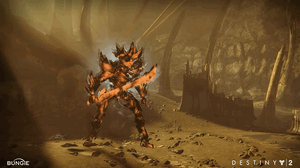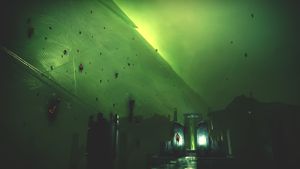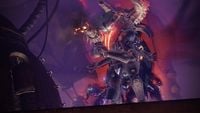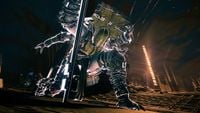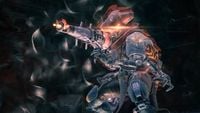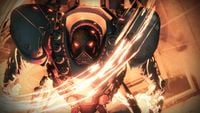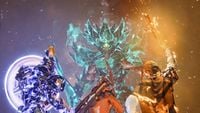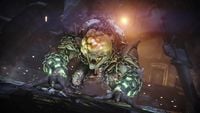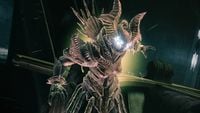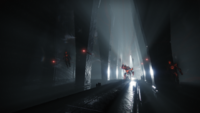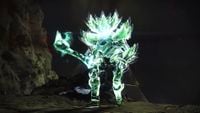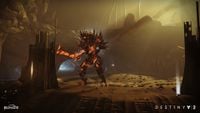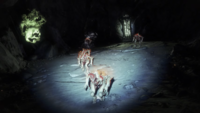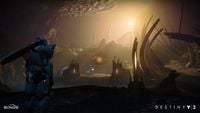Nightmare
From Destinypedia, the Destiny wiki
| Nightmares | |
|---|---|

| |
| Overview | |
|
Goals: |
Psychologically torment Guardians |
|
At war with: |
|
|
Allied with: |
Black Fleet |
|
Average height: |
Varies |
|
Average weight: |
Varies |
|
Distinctions: |
Trauma-induced apparitions of past enemies and other figures |
|
Average lifespan: |
Indefinite |
|
Notable individuals: |
Nightmare of Crota, Son of Oryx |
|
Other names: |
Phantasms |
- "The Nightmares appear to be extracted from our very psyche—violent manifestations that wreak havoc, tormenting us with our past trauma. They tease us with a life we once knew, prying into our minds and attacking our most vulnerable points. This assault on our emotions is aimed to weaken us and our sense of purpose."
- — Eris Morn.
Nightmares are apparitions of Darkness created by the Lunar Pyramid for psychological warfare; manifested as past figures and enemies to exploit the trauma and worst fears of Guardians and other beings. First appearing following Eris Morn's discovery of the Pyramid beneath the Moon, the Nightmares include phantoms of some of Guardians' deadliest foes, including Crota, Fikrul, Ghaul and Uldren Sov.
Overview
According to Hashladûn, Nightmares are malleable creations of the Pyramid, not truly alive but made of "chaos, negation, and the raw things found existing in spaces between thought and fear."[1] They are extracted from the psyche of targets, wreaking havoc by provoking grief and trauma as well as presenting a physical threat.[2]
Nightmares are usually surrounded by a miasma of crimson reddish-black Darkness with radiating ghostly tendrils. Eris initially surmised that the true purpose of the Nightmares was a tool to manipulate and exploit Guardians at their weakest; for the explicit temptation towards the Pyramids and their promises of power.[3] This would be recanted much later when she revealed that the Nightmares were in fact a defense mechanism to drive away those who would tamper with the lunar Pyramid.[4]
The Nightmares are found primarily near and in the Scarlet Keep citadel, which was built in close proximity to the Pyramid. Beyond the moon, Nightmares had propagated on other celestial bodies, roosting in Lost Sectors as its previous enemy tenants.[5] Calus, the exiled Cabal Emperor, would weaponize the Nightmares to his bidding by forming a psychic bond between the dormant lunar Pyramid and his massive flagship, the Leviathan. This in turn transformed Calus' ship into an extension of the Pyramid's resonance and allow for new Nightmares to haunt the derelict vessel.[6]
Gameplay
Nightmares are enemies that debut in Shadowkeep and are primarily encountered in Lost Sectors and during endgame activities like Nightmare Hunts and Altars of Sorrow on the Moon. They can vary in difficulty; such as Elite, Major, and Ultra, and drop phantasmal orbs upon death that grants players an "Unstable Essence" damage buff on all other Nightmare enemies for ten seconds. Nightmare bosses are often accompanied by two Major mob enemies that can respawn if destroyed, most often when boss health reaches halfway and if there are no current Nightmare enemies standing then.
Ultra-tier Greater Nightmares, especially the ones found in endgame activities, have an additional mechanic that renders them intangible with immunity to damage in a reddish-black ethereal form after they spawn additional Nightmare mobs; forcing players to clear them first to initiate the next damage phase.
Nightmares have a chance of dropping "Phantasmal Fragments" and even rarer "Phantasmal Cores" as a resource to craft weapons and Dreambane Armor at the Lectern of Enchantment, which are unlocked from Nightmare Essence weapon bounties (which can drop from bosses during Nightmare Hunts and randomly on the Moon). Even certain armor mods equipped to Dreambane armor are effective in both warding and boosting damage against Nightmare enemies.
Notable members
Greater Nightmares
- Nightmare of Anaphex, Sworn to Otzot
- Nightmare of Caiatl, Princess-Imperial - Aspect of Regret
- Nightmare of Crota, Son of Oryx - Aspect of Despair
- Nightmare of Dominus Ghaul - Aspect of Rage
- Nightmare of Elykris, the Machinist
- Nightmare of the Fanatic - Aspect of Insanity
- Nightmare of Gahlran, Sorrow Bearer
- Nightmare of Kethiks, Grief Unforgiven
- Nightmare of Navôta, Eir-Spawn
- Nightmare of Omnigul, Will of Crota - Aspect of Anguish
- Nightmare of Phogoth, the Untamed - Aspect of Fear
- Nightmare of Safiyah - Aspect of Grief
- Nightmare of Skolas, Kell of Kells - Aspect of Pride
- Nightmare of Taniks, the Scarred - Aspect of Isolation
- Nightmare of Uldren - Aspect of Shame
- Nightmare of Zydron, Gate Lord - Aspect of Servitude
Other Nightmares
- Nightmare of Arguth, the Tormented
- Nightmare of Carun, Beastmaster
- Nightmare of Cek'ik, Seeker of the Deep
- Nightmare of Emonut, Sworn of Moli Imoli
- Nightmare of Evoks, the Burned
- Nightmare of Gothrax, Swarm Protector
- Nightmare of Ha'lok, the Shield
- Nightmare of Horkis, Fear of Mithrax
- Nightmare of Jaxx, Claw of Xivu Arath
- Nightmare of Ka'hok, Sworn of Umun'arath
- Nightmare of Kelnix Reborn
- Nightmare of Kra'lok, the Sword
- Nightmare of Ky'leks, the Docked
- Nightmare of Lambiks-4
- Nightmare of Loronvis, Council Hand
- Nightmare of Qalec, the Sniper
- Nightmare of Reyiks, Actuator
- Nightmare of Rizaahn, the Lost
- Nightmare of Rovikis, Council Hand
- Nightmare of Seresis, Council Hand
- Nightmare of Sy'ad, the Unending
- Nightmare of Talgoth, Soul Smasher
- Nightmare of Tlazat, Fed to Beasts
- Nightmare of Uaoc, Spine Breaker
- Nightmare of Uroa, Sworn of Shayotet
- Nightmare of Val Dumoar
- Nightmare of Val Sinu, Hellbringer
- Nightmare of Volniks, Deathkeeper
- Nightmare of Xortal, Sworn of Crota
- Nightmare Reaver Vandal
- Nightmare Servant of Ir Yût
- Primus Or'sek, Vessel of Nightmares
- The Drowned
- The Forgotten
- The Sunken
- Unrelenting Nightmare
- Valus Thu'ur, Vessel of Nightmares
Mentioned only
Unique forces
FallenHive
Vex |
Cabal |
Scorn |
Trivia
- In a few bounties when the Haunted Forest was created, it is implied that the Vex are capable of creating Nightmares of their very own known as Terrors. They are said to prey on our greatest fears[7] and Ikora even asked if they would create shades of ourselves.[8]
- In an effort to create a puppet champion, the Daughters of Crota constantly resurrect the shattered Zulmak, Instrument of Torment by combining the phantasmal essence of the Nightmares with Zulmak's husk, creating the first hybrid of a Hive and a Nightmare.[9]
- According to Toland, the Pyramid cannot conjure Nightmares from Hive minds. They require a human psyche: anguished, burdened, Lightbearing vessels. However, this seems to be contradicted by the existence of the Nightmare of Horkis, Fear of Mithrax, unless Horkis had previously encountered the Guardians before manifesting as a Nightmare.
- Several Nightmares are effigies of individuals that are not deceased. For example, Toland exists beyond his physical form & Omar Agah's essence was transferred into an insect-like creature that now powers a weapon. This indicates the purely psychological intent of the Luna Pyramids conjuration of the Nightmares, and not, in fact, its ability to pull the spirits of the dead into being.
- Because of the connections to memory, the creation of Nightmares may be closely related to the powers of Deepsight.
Gallery
A Titan overlooking a dormant Nightamre.
List of appearances
- Destiny 2
- Shadowkeep (First appearance)
References
- ^ Bungie (2019/10/29), Destiny 2: Shadowkeep, Item Description: Heretic
- ^ Bungie (2019/10/1), Destiny 2: Shadowkeep, Lore:Letters from Eris - Regarding Nightmares
- ^ Bungie (2019/10/1), Destiny 2: Shadowkeep, Lore:Letters from Eris - Regarding the Pyramid
- ^ Bungie (2022/05/24), Destiny 2: Season of the Haunted, Bound in Sorrow | Formulating a Plan
- ^ Bungie (2019/10/1), Destiny 2: Shadowkeep, Lore:Letters from Eris: - Regarding the Spread of Nightmares
- ^ Bungie (2022/05/24), Destiny 2: Season of the Haunted, Season of the Haunted
- ^ Haunted Terrors
- ^ Colony Collapse
- ^ Bungie (2019/10/01),Destiny 2: Shadowkeep, Lore: Heretic
| |||||||||||||||||
